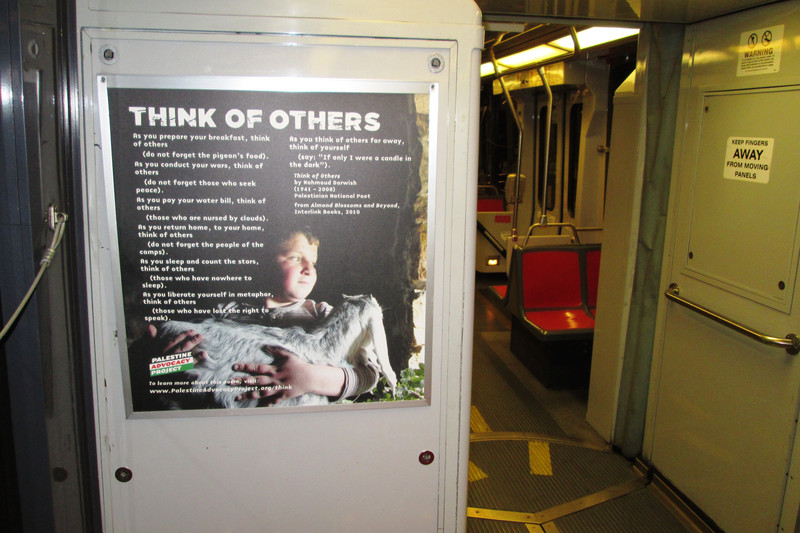Palestinian Poetry on San Francisco Buses

Electronic Intifada: If you ride on San Francisco’s Muni buses or light rail trains this month, you might pass the time contemplating the words of Mahmoud Darwish, often described as Palestine’s national poet.
Throughout March, the nonprofit Palestine Advocacy Project is running ads on the public transportation system featuring selections of Darwish’s poetry, including excerpts from “Passport,” “Under Siege,” “Earth Poem” and “A Lover from Palestine.”
The posters also feature images of everyday life in the West Bank, including Jerusalem, and the Gaza Strip.
“Darwish captures the dual emotions of homesickness and hope that have defined the past several decades of Palestinian popular art,” Palestine Advocacy Project board member Clare Maxwell said in a press release from the group. “I think a lot of people in the Bay Area will be able to relate.”
The ads also include images of everyday life in the occupied West Bank and Gaza Strip.
Darwish is recognized as one of the greatest poets of the 20th century, whose work has been translated into many languages.
Darwish was born al-Birwa in the northern Galilee, a village destroyed several years after his birth during the Nakba, the 1948 Zionist conquest and ethnic cleansing of most of Palestine.
He went into exile in the early 1970s, living in Beirut and Paris, and returned to the occupied West Bank after the signing of the 1993 Oslo accords between Israel and the Palestine Liberation Organization.
Darwish died in Houston, Texas, in 2008.
Previously, the Palestine Advocacy Project has placed ad campaigns and billboards directly highlighting Israel’s violence and human rights abuses against Palestinians.
The group says it creates “public media and education campaigns that expose Americans to the Palestinian struggle and advocate for an end to Israeli human rights abuses.”
Last November it joined forces with the American Civil Liberties Union to successfully fight for the right to display ads critical of Israel’s abuses, after Boston’s public transport system initially refused to accept them.
The ads and poems featured in the Darwish campaign can all be seen at the Palestine Advocacy Project website.


